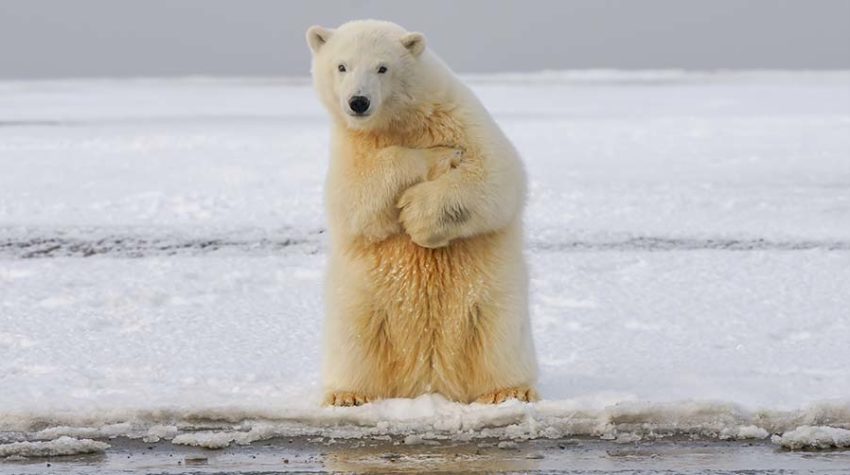
February 11, 2021Animal Law & Policy Clinic, Media ReleaseBiden Urged to Pull Unlawful Trump, G.W. Bush Endangered Species Act Rules
Polar Bear Memorandum, Others Direct No Consideration of Climate Harms
For immediate release: February 11, 2021
WASHINGTON— More than two dozen leading scientists and law professors led by Harvard Law School’s Animal Law & Policy Program and the Center for Biological Diversity petitioned President Joe Biden today to immediately rescind key policies that restrict the government’s consideration of harms from greenhouse gas emissions on animals such as the polar bear under the Endangered Species Act.
Prominent leaders including Michael E. Mann, Aradhna Tripati, Thomas E. Lovejoy, John D. Leshy and Deborah A. Sivas urged Biden to revoke the rules to make good on his executive order pledge for the government to “deploy the full capacity of its agencies to combat the climate crisis.”
“Ignoring greenhouse gases leaves the government blindfolded in its effort to protect threatened species,” said signatory Dr. Stuart Pimm, a conservation scientist at Duke University. “If he’s serious about protecting wildlife threatened by the climate crisis, from the Pacific walrus to unique birds of the Florida Everglades, President Biden has to revoke these damaging rules.”
The policies at issue include the “Bernhardt Memorandum” restricting the consideration of greenhouse emissions under the Endangered Species Act, issued by the George W. Bush administration, and regulations issued by the Trump administration in 2019 to enshrine the harmful and illegal approach.
Agencies have relied on the policies to ignore the effects of greenhouse gases and climate change when deciding whether to protect species by listing them as endangered or threatened under the Endangered Species Act, and when deciding whether their agency actions may harm listed species, as required by the law.
The Center’s climate science director, Dr. Shaye Wolf, pointed to the polar bear as an example of how the rules have weakened climate action.
“If not for these policies, the polar bear would have greater protection under the Endangered Species Act and agencies would have another mechanism to consider and reduce carbon emissions,” Wolf said. “Greenhouse gases are no different from mercury, pesticides or anything else that accumulates in the land, air or water and harms species. It’s simply ridiculous not to take them into account.”
While the Act bars any federal agency from “jeopardizing the continued existence” of any listed species or “adversely modifying” designated “critical habitat,” agencies have routinely ignored these requirements.
Under the Trump administration, for example, the Environmental Protection Agency and Department of Transportation admitted that rolling back the Obama administration clean car standards would lead to nearly 1 billion metric tons of additional greenhouse gas pollution through the end of the decade. Yet, they refused to examine the effect of that pollution on polar bears and other listed species.
“Given the evidence showing that climate change harms endangered and threatened species — and definitely hastens their demise — these policies are directly contrary to the purposes of the Endangered Species Act,” said Elizabeth MeLampy, the Harvard Law student who took the lead in drafting the request. “As a law student preparing to practice animal and environmental law during the Earth’s sixth mass extinction, I’m counting on President Biden to use every tool to make sure our coral reefs, our songbirds, and all the other glorious creatures living on Earth are still around for the next generation.”
Here is the full petition to President Biden and exhibits B and C to the letter.
Media contacts:
Elizabeth MeLampy, Harvard Law School, (617) 852 6484, [email protected]
Kassie Siegel, Center for Biological Diversity, (951) 961-7972, [email protected]
Shaye Wolf, Center for Biological Diversity, (415) 385-5746, [email protected]
The Animal Law & Policy Program at Harvard Law School is committed to analyzing and improving the treatment of animals through the legal system. In 2019, it launched the Animal Law & Policy Clinic to provide students with direct hands-on experience in animal advocacy on behalf of both captive animals and wildlife, including litigation, legislation, administrative practice, and policymaking.
The Center for Biological Diversity is a national, nonprofit conservation organization with more than 1.7 million members and online activists dedicated to the protection of endangered species and wild places.
